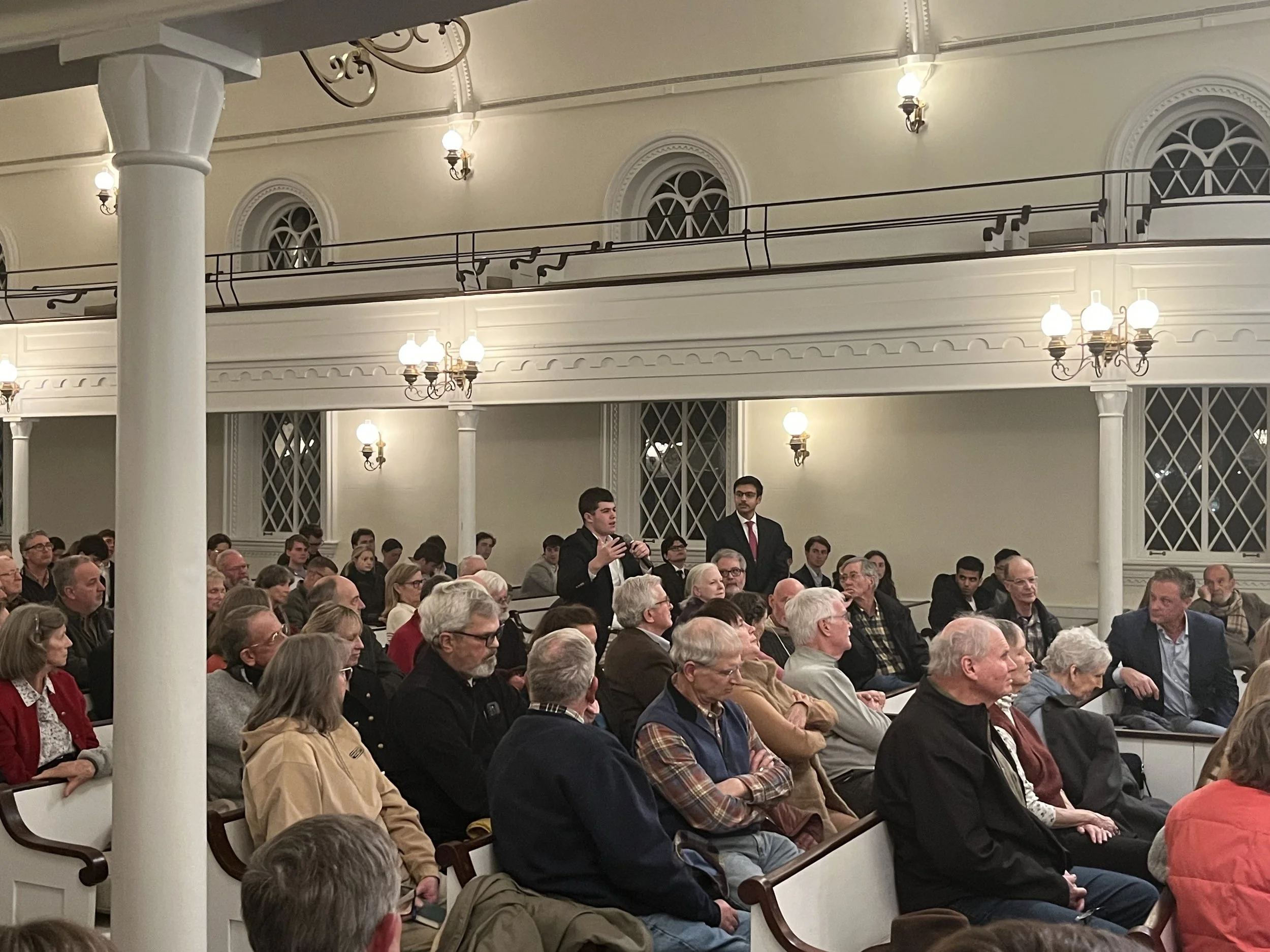Gerard Baker on the New American Revolution
Gerard Baker on the New American Revolution
The former editor-in-chief of the Wall Street Journal analyzes Trump’s reelection.
(Gerard Baker speaks to the audience at Lee Chapel | SOURCE: The W&L Spectator)
“I hate to say this … but Trump’s basically right about the media,” said Gerard Baker, answering a question from the crowd.
Gerard Baker, the editor-at-large of the Wall Street Journal, addressed a crowd of 140 on January 27 at Lee Chapel, National Historic Landmark.
Baker previously worked as a producer for the BBC in the U.K. and the U.S. from 1988 to 1994. From 2013 to 2018, he served as the deputy editor-in-chief and then editor-in-chief of the Wall Street Journal, where he restructured large parts of the paper and faced accusations of being too soft on the Trump administration.
(Gerard Baker amidst his speech in Lee Chapel | SOURCE: The W&L Spectator)
Baker began his speech by explaining why he believes Donald Trump’s recent election represents a revolution led by American citizens. “Sometimes presidents can change the direction of their country … simply by dint of their election alone,” he said. Baker later characterized the 2024 presidential election as “a decision by the American people that they want to change direction.”
He went on to explain many unique characteristics of Trump’s reelection. These included Donald Trump becoming the second president elected to non-consecutive terms, the first Republican candidate since 2004 to win the popular vote, and the first non-incumbent Republican to win the popular vote since 1980.
Baker continued, touching on turnouts for key voter demographics. He noted that Trump won the highest percentage of the African American vote for Republicans since the 1960s.
Baker also addressed political geography, stating that Trump “did remarkably well without winning … in states like New Jersey and New York, where he narrowed the gap significantly.”
Baker then explained his conception of the election, as representing, “a growing disillusionment that Americans have had with their leadership over the past 20 years.” He tied this “disillusionment” back to the “ideological capture” he viewed as being present in Western institutions “since the end of the Cold War.”
Baker identified three main poles, or areas, where this “ideological capture” was taking place. Baker’s first pole was “globalism,” the second pole was “green extremism,” and the third was “woke authoritarianism.”
(The audience listens to Gerard Baker’s speech | SOURCE: The W&L Spectator)
Baker described globalism as “the idea that we don’t really believe in national sovereignty.” He later added that under this globalist perspective, “companies don’t really have any obligation to look after American workers.”
Baker then discussed his views on radical environmentalism. He described “green extremism” as an idea that has taken hold in the last twenty-five years “in much of our establishment, in the leaders of the world that the planet is existentially threatened by climate change.” He explained that “I’m certainly not a climate change denier,” but that “sensible policies to address climate change can be done without doing enormous damage to the economy.” Baker summarized: “We don’t have to destroy ourselves to save the planet.”
The final pillar is the phenomenon of “wokeness” and identity politics. He summarized these viewpoints as “this new idea in the course of the last twenty years or so that somehow all the evils in the world have been caused by, frankly, white people.”
Baker referred to these views as “woke cultural authoritarianism.” Baker lamented that it has gotten “to the point now where apparently we address historical discrimination in the world by now practicing a new form of discrimination,” referencing comments made earlier about policies like affirmative action and race-based reparations.
“So those three: globalism, climate extremism, woke authoritarianism. They have been dominant ideological strands … and it’s that I think that has been rejected in this election,” Baker argued.
Baker briefly touched on what he hopes the ascendant Trump political movement can achieve, saying it has the “opportunity to move America towards a culturally more tolerant country … one that acknowledges the values of America, the virtues of this country that make this country great.”
Baker admitted that he still has some reservations about President Trump. “Some of the things he proposes, I think, go too far,” he said, naming Trump’s “attempt to overturn birthright citizenship … guaranteed in the 14th Amendment” as one example.
He also stated that he believes “there are many questions about his character.” “It goes back to whether or not he has the character to focus on what needs to be done for the country…as opposed to focusing on the things that he wants to do to promote himself,” Baker said.
Following his talk, Baker opened up to audience questions. During the Q&A, he answered questions about the lack of significant protests against Trump’s inauguration and the increased interaction he has had with prominent figures like Bill Gates and Mark Zuckerberg.
Baker was additionally asked what actions could be taken by President Trump to make him unfit for office. Baker responded, saying if the president put personal motives ahead of serving America.
(Member of the audience asks a question to Gerard Baker | SOURCE: The W&L Spectator)
Determined to conclude his talk on a lighter note, Baker left attendees with a joke from Winston Churchill: “The great thing about America is that America can always be relied upon to do the right thing, but only after it has exhausted every other alternative.”





